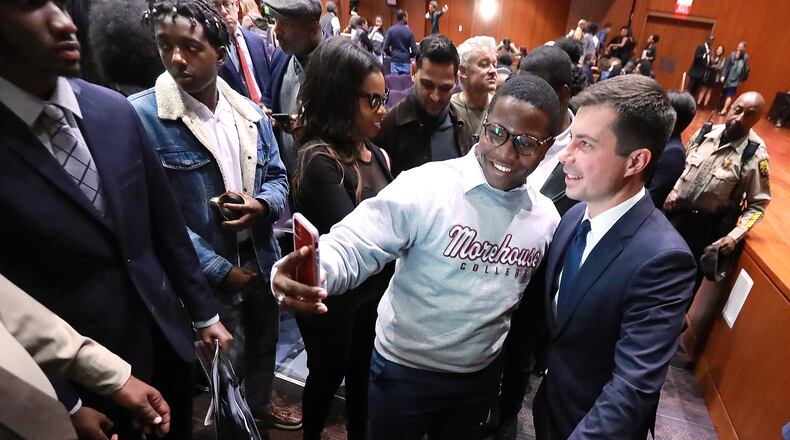The presidential candidates who are converging upon Georgia this week for the Democratic debate have made clear that voting rights are at the center of their campaign pitches to local voters, often highlighting Stacey Abrams and her narrow defeat in last year’s gubernatorial race.
And many have planned events at historically black colleges and universities or other sites at the center of African American life and culture, mindful of the power of the black electorate in Georgia’s March 24 primary.
It’s why U.S. Sen. Amy Klobuchar outlined her voting rights agenda Monday afternoon at the Hammonds House Museum, a historic home that has been converted into an African American history museum.
Related: From protests to watch parties: Debate events happening in Atlanta
Related: The major issues in Georgia
Related: Where to find the White House hopefuls in Georgia this week
It explains Pete Buttigieg’s decision to pitch a plan to boost funding for institutions focused on minorities at Morehouse College, where the South Bend, Ind., mayor answered questions about how his plan for black America will tackle systemic education issues.
And it’s a factor in the schedules of a half-dozen other 2020 hopefuls who plan to tackle ballot access, college affordability and other issues aimed at energizing black voters while they’re in Atlanta this week for Wednesday’s debate.
“We have to take this way beyond party politics,” Klobuchar said after a discussion with leaders of several civil rights groups. “This is about peoples’ rights, established in our Constitution to be a part of a democracy. That’s what I’m covering with my plan.”
She picked Georgia to roll out a plan to require states to use paper ballots and block states from purging voter rolls of residents who haven't cast a ballot in recent elections for a reason: Georgia plans to cancel more than 300,000 voter registrations this year, following the largest single removal of voters in U.S. history in 2017.
Democrats see voting rights as a potent 2020 issue, particularly after the swirl of issues that helped shape Georgia’s 2018 race for governor. That contest was marked by disputes over the counting of absentee and provisional ballots, voter purges and problems plaguing polling sites that triggered a spate of federal lawsuits and outrage from critics who see voter suppression at work.
Republicans, meanwhile, countered that their efforts were aimed at preventing voter fraud and point to Georgia’s record 7.4 million registered voters and its automatic voter registration program.
AJC Poll: Georgia voters on the candidates and issues
Related: Voting struggles put spotlight on major elections in Georgia
Related: Georgia anti-abortion law could drive discussion at Democratic debate
A few miles downt the road from where Klobuchar discussed her voting rights plan, Buttigieg spoke about his Douglass Plan to empower black America during a campaign event at Morehouse that attracted a couple of hundred people. He gave a 15-minute stump speech before answering questions from a professor and student about how his plan will tackle issues such as improving education and job opportunities for African Americans.
After the event, some of the students in the audience said Buttigieg needs to go deeper on the issues and freshen his message if he hopes to connect.
“He has to come up with a more unique approach to get young black voters,” freshman political science and philosophy student Bennie Williams said.
Williams said Buttigieg did not earn his vote Monday night, but he is open to hearing more from the candidate currently leading the polls in Iowa.
“I have to hear more about his Douglass Plan, and he has to explain his race relation problems better,” Williams said.
Businessman Tom Steyer will hold a roundtable with black clergy members Tuesday, followed by a meet-and-greet at a black church in East Lake. Also Tuesday, former U.S. Housing Secretary Julian Castro will talk about poverty, immigration and housing at the historic Paschal’s restaurant.
The events ramp up again a day after the debate, when U.S. Sen. Kamala Harris hosts a “Black Women Power Breakfast.” U.S. Sen. Bernie Sanders will be at Morehouse to discuss his plan to increase funding for HBCUs and help graduates saddled by student loans. Later that evening, U.S. Sen. Elizabeth Warren will give a speech at Clark Atlanta University focused on honoring labor activists.
Three presidential candidates — Buttigieg, U.S. Sen. Cory Booker and entrepreneur Andrew Yang — will join Abrams on Thursday at Ebenezer Baptist Church as to work on a phone bank that aims to contact voters whose registrations might be canceled because they haven't participated in elections for several years.
It makes political sense for candidates to schedule stops at historically black colleges and universities to connect with black voters and influential community leaders with one visit, Howard University political science professor Keneshia Grant said.
“And, they get to send a signal to the people outside of the HBCU community that they care about black people,” Grant said.
But she said the message candidates present during these visits is just as crucial. Grant applauded Warren’s speech topic in particular, saying it feeds into a narrative that she cares about and wants to connect with black women.
“She is showing up not just to talk about who she is as a candidate but to celebrate black women,” Grant said. “And we know that she thinks about black women because she’s shown us all along that she does.”
BALANCED COVERAGE
The Atlanta Journal Constitution is covering all angles of the 2020 election and Georgia’s role in it. Earlier this month, we wrote about President Donald Trump’s visit to Atlanta as part of his effort to draw black voters to the GOP. Today’s story focuses on how Democratic presidential candidates in town for Wednesday’s debate are hoping to sway black voters to their side.
Keep Reading
The Latest
Featured






